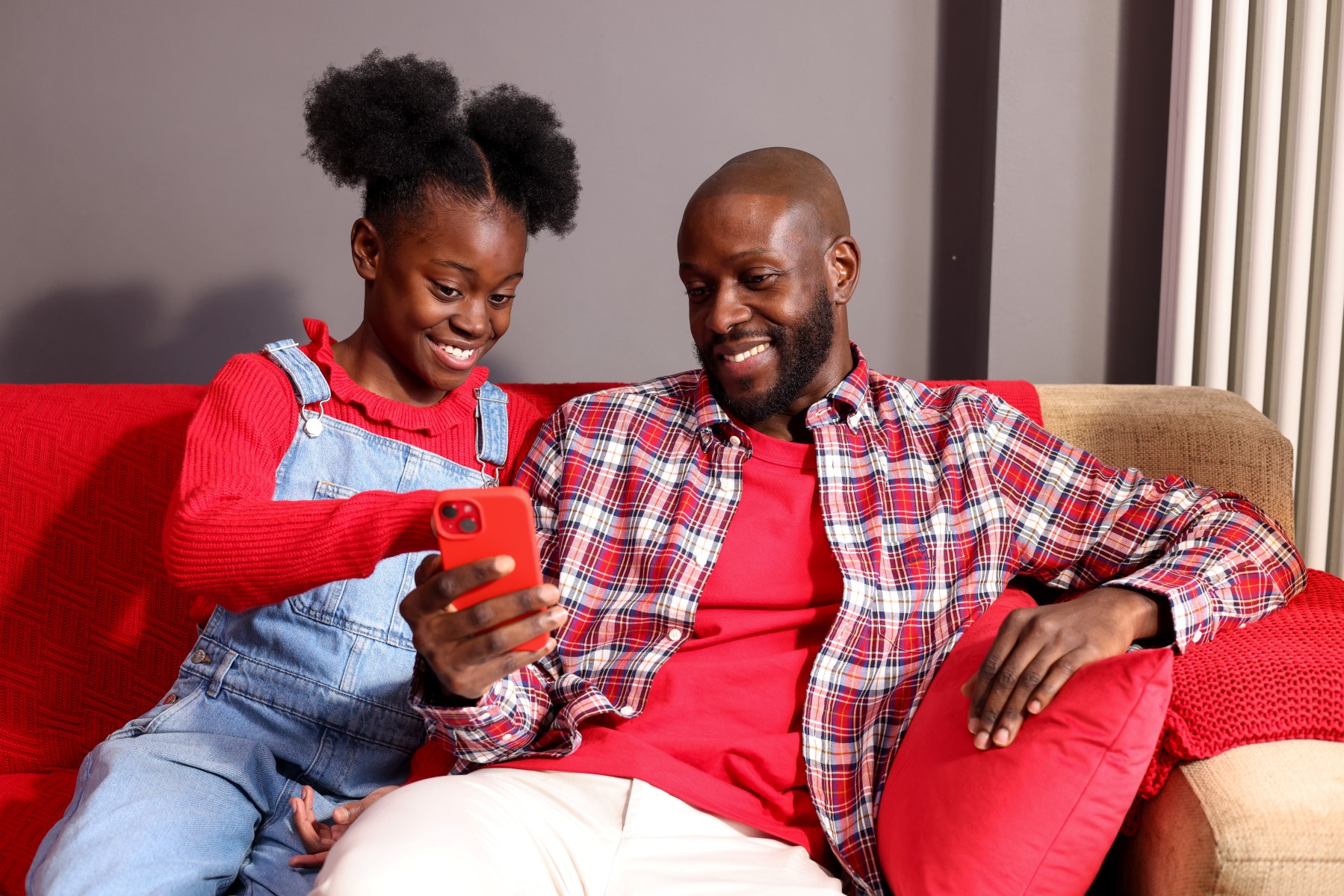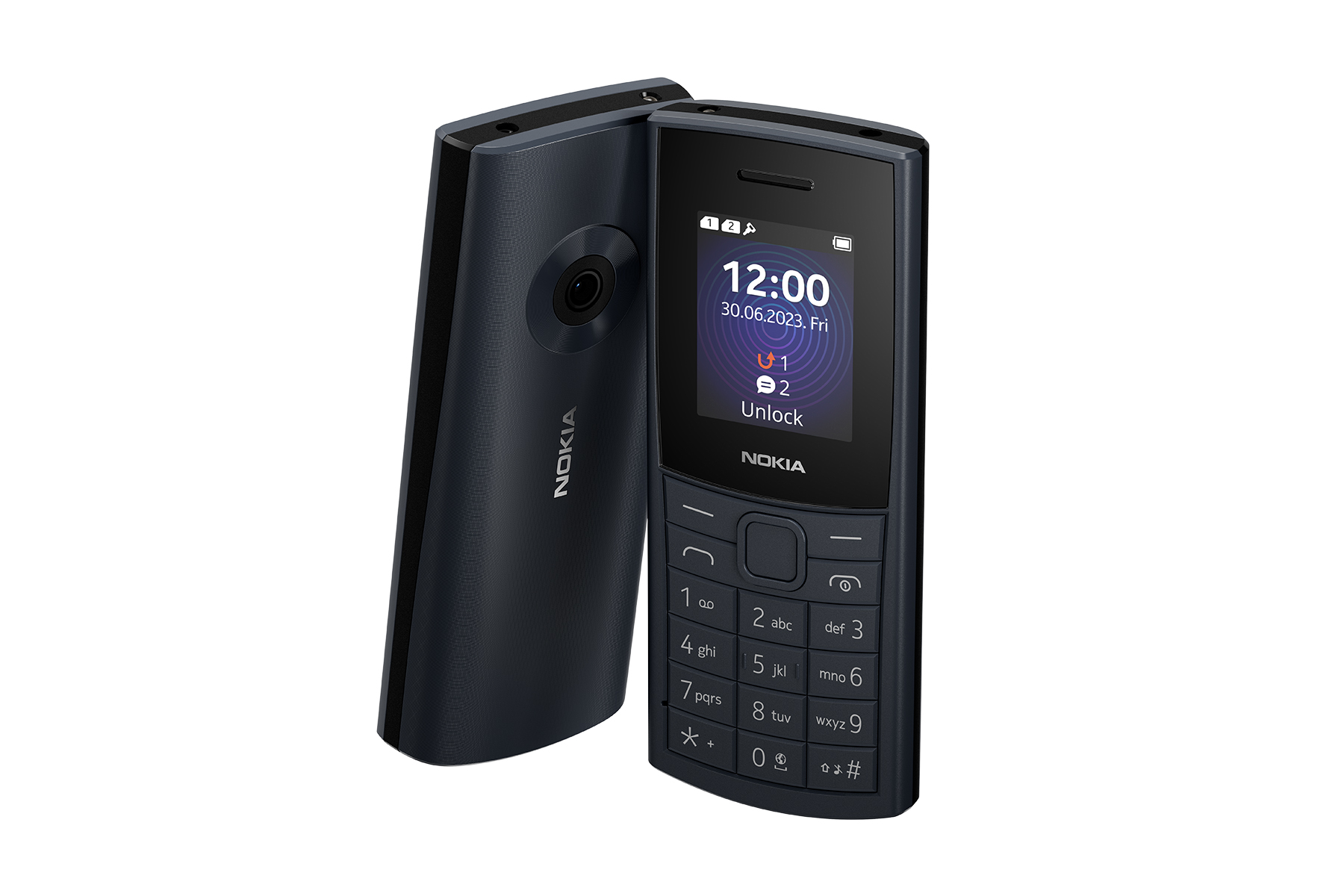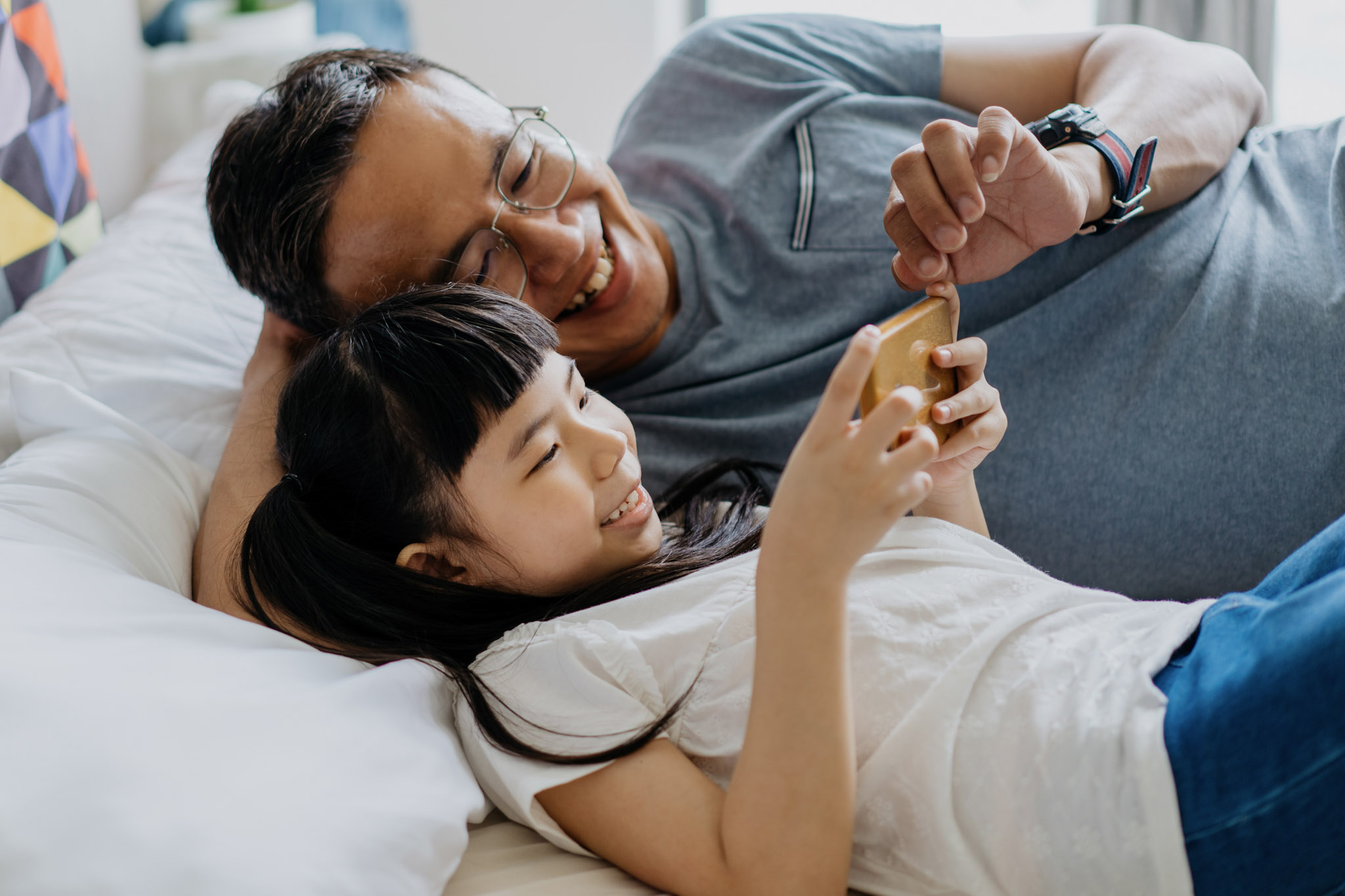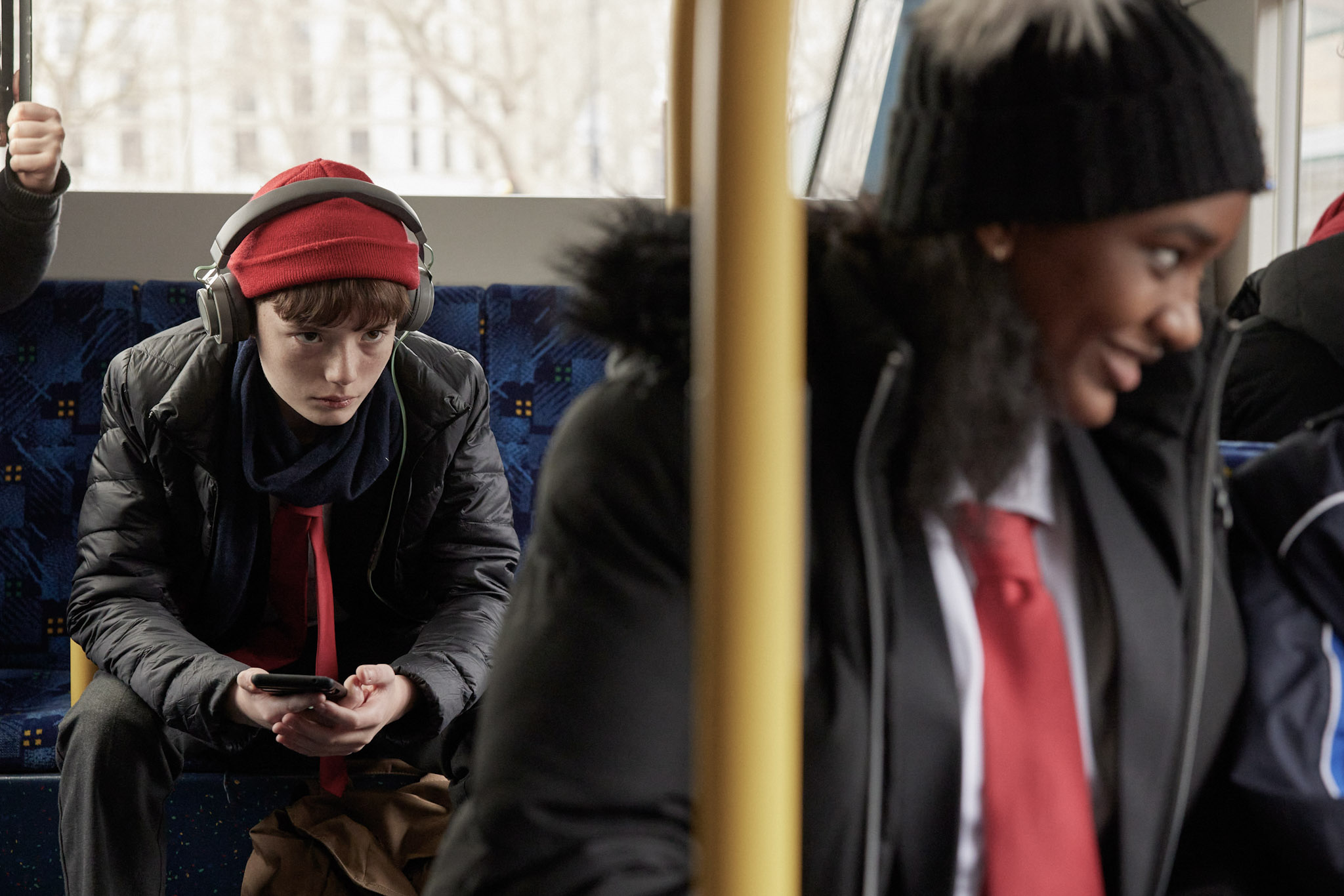The new research, into parents' views and concerns about getting their child's first phone, comes as Vodafone and the NSPCC launch their online resource to help parents make an informed decision.
- New research from Vodafone reveals choosing when to give a child their first mobile phone is as hard as choosing a school.
- Three quarters of parents feel it is important for a child to have a phone when they start secondary school. However, over half worry about it.
- Meanwhile, children are more excited to get their first phone than their first pet or bicycle.
- Vodafone announces its partnership with the NSPCC, launching a growing online platform of resources to help keep children safe online and provide top tips for buying children their first phone.
New research reveals choosing when to give a child their first mobile phone is one of the hardest decisions a parent will make, with 36% saying it ranked equally as hard as choosing which school their children should go to (36%) and only topped by deciding when a child should go to the park or shop themselves (56%).
The study by Vodafone, to mark the announcement of their new partnership with the NSPCC and a new platform of resources, also found that while parents find the decision hard, overwhelmingly, they felt a phone was important to have when a child goes to secondary school (74%), to keep them safe when travelling to and from school (42%) and to know where they are when they’re out on their own (45%).
The data also suggests parents lack confidence in setting up safety features on key applications that children use, with many feeling in the dark with newer apps like BeReal (93%), Snapchat (85%) and TikTok (81%). Meanwhile, over half (53%) say the decision is difficult because they are worried about them seeing inappropriate content or being bullied online.
‘We need parental controls to protect our kids, but we also need to talk’
As Vodafone UK launches Digital Parenting Pro, a content controls hub for parents and carers, Nicki Lyons, Chief Corporate Affairs & Sustainability Officer, reflects on how resources like this can protect kids from unsuitable content and help families have more informed conversations around online safety.
To equip parents and carers with the information and tools they need to navigate buying children their first phone and keeping them safe online, Vodafone has announced its partnership with the NSPCC, the UK’s leading children’s charity. A key element of the partnership will be the ongoing development of a new online platform, designed to provide parents with practical resources for buying their child’s first phone, like setting parental controls as well as offering advice on both new and refurbished devices to help them get the best deal.
This complements the Digital Parenting resources and articles Vodafone has been providing families with for many years, including one of the UK’s largest directories of parental controls and safety settings, Digital Parenting Pro.
The NSPCC reports that, in 2022/23*, 10% of calls to its Helpline that focused on mobile phones or online platforms occurred in August, highlighting a spike in online safety concerns ahead of the new school term.
While parents may have their concerns about a first phone, children are excited. On average, they ask for a phone multiple times a week, which for most families begins when they turn nine. Nearly one-in-10 children even ask for a phone every day (9%). Parents added that children were even more excited about getting their first phone than their first pet or first bicycle.
Overall, the research found that almost one in 10 (9%) spend five months or more discussing when to buy their child their first phone. When they do decide to buy a phone, many parents and carers admit not knowing where to start, as one-in-five (21%) said they find it hard to know which mobile phone to pick for their children. Despite this, half of parents (48%) said they would consider the sustainable option and choose a refurbished phone to give to their child.
Sharenting: How sharing too much online could put your kids in danger
Oversharing can have unintended consequences, but avoiding such grief needn’t be a family drama. Here's what you need to know.
Nicki Lyons, Chief Corporate Affairs & Sustainability Officer at Vodafone UK, said:
“We know a child’s first phone is a big moment for families – exciting for children but bringing with it new concerns for parents and carers. Our research highlights that many mums, dads and carers don’t feel confident they know all they need to keep their children safe online or where to start with choosing their first phone.
“That’s why, for well over a decade, we’ve been committed to helping them navigate being online with their children. And now, working with the NSPCC, we’re supporting them with even more practical resources and tips to give them the tools and confidence they need when their children step into the online world with their first phone.”
Kate Edwards, Associate Head of Child Safety Online at NSPCC, said:
“At the NSPCC, we are doing everything within our power to ensure that children are safe when they enter the online world, including campaigning for a more robust online safety bill.
“We know a child’s first steps, first words and first day at school are all exciting moments for families but getting a first phone is one which can be tempered by fear.
“This is why our partnership with Vodafone is so important, together we can support parents to understand how to keep children safe.”
Your Child’s First Phone - what you need to know
Getting your child their first smartphone doesn’t have to be daunting with help from the NSPCC and Vodafone.
Vodafone & NSPCC 9 safety tips when getting a child their first mobile
- Set it up as a ‘child’s phone’
Speak to your mobile provider about restricting access to certain content and to avoid overspending on the bill.
- Turn on apps’ safety settings
Turn on content filters, chat filters and privacy settings, as well as restrict in-app purchases, on all applications.
- Restrict WiFi
Contact your internet service provider for help in setting up content controls for devices connected to your home’s WiFi.
- Talk to your child
You know when your child is old enough to talk about certain topics without becoming upset or frightened. When talking about risks, be honest but try not to catastrophise.
- Check location settings
Review location settings on their favourite apps and games, then remind your kids that they shouldn’t share their location online.
- Know about app safety settings
For example, TikTok has a Family Pairing feature that links a parent’s account with their child’s. Snapchat offers built-in parental control features, while Instagram has its Parental Guide for Teens with helpful tips.
- Don’t forget about online gaming safety
Check each game’s age rating to make sure it is appropriate and adjust the settings to make sure chat and voice features are turned off. You can set limits on screen time too.
- Report harmful online content
If you are concerned about something your child has seen online, you can visit the NSPCC page about reporting online safety concerns or call the NSPCC helpline.
- Know where to go for help and advice
Vodafone’s online resources are a great place to start, helping you decide which phone is best for your child. You can learn more about safety settings in apps, in games and on devices using Digital Parenting Pro.
The launch of this new resource is part of Vodafone’s everyone.connected campaign which is committed to tackling digital exclusion by helping four million people cross the digital divide by 2025. This includes a range of partnerships and initiatives to help give more people the connectivity and skills they need to stay connected and participate fully in an increasingly digital society.
As part of the proposed merger with Three UK, Vodafone has committed to retaining all current measures to support vulnerable customers impacted by the cost-of-living crisis, including social tariffs and digital inclusion campaigns.
Stay up-to-date with the very latest news from Vodafone by following us on Twitter and LinkedIn and signing up for News Centre website notifications.
-Ends-
Notes to Editors
* 2022/23 refers to the NSPCC’s last financial year.
Vodafone’s new online resource and Digital Parenting resources can be found online.
Research from 1,000 parents with children aged between eight and 17, conducted by One Poll and commissioned by Vodafone UK.
About the NSPCC
The NSPCC is the leading children’s charity fighting to end child abuse in the UK and Channel Islands. Using voluntary donations, which make up around 90 per cent of our funding, we help children who’ve been abused to rebuild their lives, we protect children at risk, and we find the best ways of preventing child abuse from ever happening. So, when a child needs a helping hand, we’ll be there. When parents are finding it tough, we’ll help. When laws need to change, or governments need to do more, we won’t give up until things improve.
Our Childline service provides a safe, confidential place for children with no one else to turn to, whatever their worry, whenever they need help. Children can contact Childline 24 hours a day, 365 days a year.
Our free NSPCC helpline provides adults with a place they can get advice and support, share their concerns about a child or get general information about child protection. Adults can contact the helpline 365 days a year.





![Portrait of school age boy sitting at kitchen table do not want to eat[Adobe Stock] stock photo of a young boy sitting at a kitchen table, refusing to eat the food in front of him](https://www.vodafone.co.uk/newscentre/app/uploads/2024/03/Portrait-of-school-age-boy-sitting-at-kitchen-table-do-not-want-to-eatAdobe-Stock.jpg)

